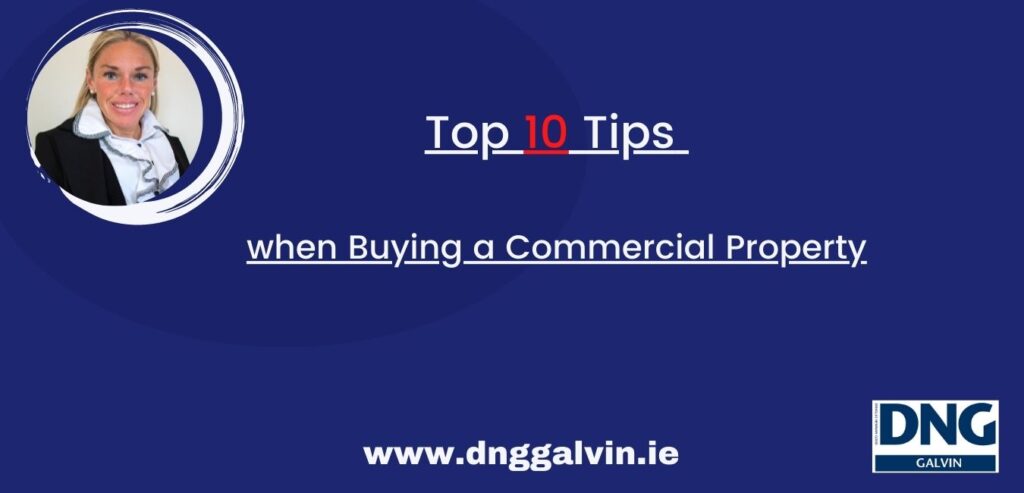10 Tips when Buying a Commercial Property

Top 10 tips when buying a commercial property
Are you considering investing in commercial property – either for your own business or to rent to another? Check out my key advice below:
IF you’re looking to get more returns on your savings, an investment in commercial property may well be worth exploring. Commercial property frequently offers higher rewards in comparison to some residential investments, while commercial lease tenures are typically longer and can provide more security of income. In addition, when commercial tenants run their business in your property, they clean, renovate, and maintain it regularly. While investing in a commercial property may present attractive financial opportunities, like all investments it isn’t devoid of risks. The investor should be aware of these and should analyse a range of factors before making any investment.
1. WHAT ARE YOUR AIMS?
As an investor identify your motives for investing in commercial property. For example, is it the security of bricks and mortar you want, or do you want to include it as part of your pension fund?
2. GET FINANCIAL ADVICE
Always seek financial advice first. Liaise with an accountant and a number of lending institutions to find the most tax-efficient way of investing. Know the time frame you are looking at. Ascertain the percentage returns you can expect and the level of risk involved. When securing funds from financial institutions the main elements that are considered are, the length of lease, income and tenant schedule. You should also ensure that the agreement for sale and purchase is signed subject to you obtaining finance, if finance isn’t unconditionally approved before the agreement is signed.
3. RESEARCH THE MARKET
Research the various sectors of the commercial market to pinpoint which sector best suits your needs. The most important way of doing this is to connect with estate agents in the area. The internet can be a great tool, but only if you know what you are looking for, so make sure that when you are talking to an expert, they can help you to find a property that matches your search criteria. Retail, industrial and office are the traditional sectors in the commercial market. In recent years nursing homes, wind farms and healthcare centres are growing in popularity. An estate agent will inform you of prices, yields and provide an in-depth knowledge of market trends, which in turn will help you identify the sector that best suits your investment. An estate agent can also help you to narrow down your focus and consider more specific details such as multi-let or single-let. Multi-lets provide clients with diversification but it all boils down to the tenant covenant. Multi-let units may need management companies in place to manage common areas and service the premises. Commercial reports including the MSCI/SCSI quarterly property index point to the strength of logistics/industrial sector – warehousing etc – due to increase in online activity
4. LOCATION, LOCATION, LOCATION
Location has always been one of the most important things when purchasing any property. Prime city areas attract blue chip tenants and provide the best return for investors. Access to good road networks, employment and services continue to be essential for business success. In recent times businesses have been more open to locating in secondary/rural locations where there is good broadband, and they can get better value for money. Hybrid working conditions and young people returning to their home towns are likely to have a positive impact on the West Cork commercial property market.
5. DEMOGRAPHICS
Consider also the demographics of the people living in the area. Assess the population and spending potential of the people residing in and/or visiting the area, to help you decide whether or not the property is suitable for conducting different types of businesses. Lastly check the parking arrangements in the vicinity, inadequate parking space can discourage customers. Again, an estate agent will have a thorough knowledge to inform you of local demographics.
6. BUILDING STRUCTURE AND PLANNING
Get professional advice on the structural aspects of the property from a building surveyor. The condition of the property will have an impact on the cost of maintaining it. New builds tend to be more energy efficient and incur lower running costs. Always ask the registered contractors for the relevant certificates for new builds. Older properties may require refurbishment but if bought at a discount and refurbished can lead to capital appreciation. Ultimately your choice will be dictated by your aims and level of risk exposure. Research the planning trends in the area. Check with the local authorities to ensure planning permission and fi re safety requirements are in order. Zoning is another important factor as this will dictate the type of business that can operate there.
7. LEGALITIES
Engage a solicitor to conduct legal due diligence before purchase. Having a good marketable title is essential for liquidly and funding purposes. Other legalities to be checked include; Land registry map, easements, floor plans and that the tenant schedule is correct and up to date. If the property you are buying is part of a complex or unit it is essential to investigate any obligations attached to same. If purchasing a property with existing tenants check if they or their predecessor in title, have landlord and tenant renewal rights. If they have been in occupation for 5 years or more, there are often additional obligations that must be met by the landlord, including the tenants’ rights to renew the lease. Examine existing leases having particular regard to rent review clause, insurance, get out clauses. It is prudent to have rent reviews every few years with the clause reverting to market rent to protect your investment. In relation to insurance the majority of leases are on a Full Repairing and insurance basis (where the tenant is responsible for repairs internally and externally).
8. TENANT COVENANT
Tenant covenant is a key factor. Instruct an estate agent to assess the strength of the tenant covenant. In doing so the estate agent will assess their creditworthiness as well as the industry in which the business operates. Th is will help to assess their ability to pay bills, rates, service charges, etc.
9. ENVIRONMENTAL AND SUSTAINABILITY
There are a number of environmental and sustainability factors to consider. Asbestos can cause problems in old commercial buildings with asbestos roofs. Th ese buildings are not energy efficient and many investors will seek to increase the building energy rating (BER) by renewing the roof. Disposing of asbestos is a costly process. Check the local area plan to ascertain the type of zoning and physical issues such as projected flooding or land stability. Are there any future area plans that will impact on the property? In certain areas land can be contaminated be it from previous uses or natural contamination in the area. It is worth investigating as contamination can spread from neighbouring land. Building Energy Rating (BER) impact on the sustainability of the building.
10. COSTS
The acquisition of a commercial property can be costly. It important to factor in all hidden costs associated with the investment. Th ere is the initial purchase price but you must also consider costs such as stamp duty of 9%, legal fees, building survey and acquisition. Then there are the reoccurring costs, insurance, tax on rental income and vat. Th e majority of commercial purchases are subject to VAT at 13.5%. Once registered you will have to charge VAT on the capitalised value of a long-term lease. Some tenants may not be in a position to reclaim VAT and will need to be informed that the lease is subject to VAT. While investing in a commercial real estate asset can be costly, it can also be a rewarding undertaking. Take time to make a decision and ensure you are comfortable with the level of risk involved. Connect with an estate agent in the area to obtain expert advice and to ensure you are
notified of any relevant properties coming on the market. You would be surprised how many properties never get advertised to the public. In fact, the best ones are often acquired shortly after the current owner decides to officially put them on the market. The aforementioned tips will give you the right perspectives on investing in a commercial property and help you strike a profitable deal.
If you would like to be kept up to date with the latest listings or avail of advice. Please get in touch with me via majella@mgalvin.ie https://dnggalvin.ie/contact/
